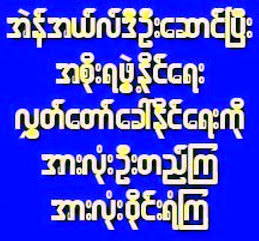
Yangon (AsiaNews) - The future of Myanmar does not depend on the "international community" or on "individual and domestic movements," but is connected to the strength and unity of "a people that must become the architect of its own destiny." This is the hope that a Catholic source in Burma has expressed to AsiaNews - on condition of anonymity, for safety reasons. This source has agreed to talk about the reality of the country and prospects for the future, the ideal of democracy and the fears of new repression, but also about the "hope of a people thirsty for God" in constant search of an "ultimate reality that can raise their spirits" from misery, pain, and daily frustration.
A large part of the population is becoming "increasingly poor" and surviving on "less than 120 U.S. dollars per year." Human rights, personal and religious freedom, democracy: these are empty words in Myanmar, where a military dictatorship has ruled unopposed for more than 20 years, silencing those who seek to express dissent. The source says that it is sure that the dictatorship - over the long term - will fall, as happened in the past in the Soviet Union and in other places dominated by totalitarian regimes, but that this will depend on a "struggle at the local level" to fight "not by open warfare, but through a slow operation of erosion from within," using the force "of reason, of dialogue, and of peace." An essential role can be played "by the media and the internet," in spite of the tight control exercised by the military, because it allows "gathering news from all over the world" and learning about "a reality different from the official version propagandized by the authorities."
China has extended its tentacles over the former Burma, shielding the military junta in power from the international community. "China is more interested in protecting the government with which it conducts business," the source continues, while ignoring the civilian population, according to the logic of "noninterference in the domestic affairs of another country. This is why the junta is becoming increasingly strong" in appearance, but is following a logic of "constant repression out of fear of losing power" in view of the elections in 2010.
Months later, the refugees of cyclone Nargis are still in a dramatic situation. Previously, the military junta confiscated the humanitarian aid provided by international agencies, and then "extended its reach" to the most far-flung areas, in which still today there are "thousands of people dying of hunger or thirst" because they have no food or water. Humanitarian organizations are seeking to bring aid to the most needy, and the Church itself can play an "essential role" in aid and assistance programs, thanks to the work of the "episcopal conference, which is coordinating the interventions of various associations, including the local branches of Caritas." Catholics, the source says, are working in the territory thanks to a significant presence of volunteers and associations connected to dioceses and parishes: this work is open, but discreet, not showy, so that it can truly reach the people without provoking the anger of the military junta. "The religious associations, especially the Catholic ones," the source continues, "are essential because they provide reliable figures like sisters, nurses, assistants, and volunteers who know what they are doing and what needs to be done to help people who, still today, are suffering on account of the disasters caused by the cyclone."
The task of Christians remains that of transmitting "a sign of hope," and "cooperation with the Buddhists can become an important means of bringing fear to the regime, which is afraid of this united purpose. But great caution must be used, and interreligious dialogue must continue, as much in concrete activity as in the work of evangelization."
There is a thirst for God in the country, as shown by "the many cases of conversion to Christianity," because this is capable of offering a message of hope that goes beyond daily suffering, but above all because the Burmese people "while remaining connected to their own culture and their own traditions, desire to encounter Christ" and the message of salvation that he brings, in spite of "the pressure exercised by the government" aimed at "limiting" conversions. In the country, "religious freedom is contemplated by the constitution," but it is applied "according to a very subjective and particular criterion" by the military junta.
The last reflection is dedicated to the most famous Burmese activist for democracy, Nobel laureate Aung San Suu Kyi: "The military junta," the source confirms, "has shut her up in a corner, keeping her under close surveillance, but she remains very popular and respected by the people." The role of the "Madam" remains fundamental in the struggle for democracy in the country, but "she cannot do everything by herself." It is important that the people support her in her "work of coordination among the various opposition factions," and that she remain always a point of reference in promoting the values "of democracy, respect for human rights, and religious freedom: the military junta is aware of her influence, but the Madam cannot fight by herself: she needs the support of the people."







No comments:
Post a Comment